Table of Contents
- In this episode
- SEO News & Tips
- SERP TurbulenceUpdates for You, with a Follow button
- New Podcast Episode!
- More SEO goodies
- Creating helpful content workbook
- AI News and Tips
- ChatGPT Custom instructions
- Demis Hassabis NYT interview
- Local SEO
- Great articles published this week
- SEO Jobs
- Subscriber Content
- Next week: Analyzing content impacted by the helpful content system
"Updates for you" in the SERPS, ChatGPT for SEO uses, case studies on improving CWV and a lot more: Episode 296, July 24, 2023
Last week’s episode (295) See all episodes Subscriber Content
There’s so much covered in this episode. The most important stories covered include:
- New “Updates for You” feature Google is testing + Following websites
- ChatGPT custom instructions
- Great articles published this week including Barry Schwartz’s experience in transitioning off AMP pages
- SEO Tips and stories:
- Did John Mueller call out Niche site owners?
- Manipulating EEAT with fake authors😬
- More discussion from Google on Page Experience
- Comparison carousel spotted
- Ongoing SERP turbulence
- AI Tips and stories:
- Government regulation on AI
- Llama 2 from Meta
- Cool uses of Bard image search
- ChatGPT custom instructions
- Code interpreter uses
- Increase on ChatGPT Plus message cap
This week’s subscriber content includes the following:
- Does it make sense to work on improving Core Web Vitals? I had a bunch of people ask me whether working on Core Web Vitals is worth it, so spent some time finding case studies that show that in some cases, yes, it can make a big difference. I also included the prompts I used to have Claude help me summarize vast amounts of case study information.
- New documentation from Google on how to build trust with your customers. (Sure sounds like E-E-A-T to me)
- What the QRG says about popularity – Your reputation online for your topics is incredibly important.
- Ways people are using ChatGPT, esp code interpreter for SEO
- Summaries of the articles recommended in this newsletter – I used a combination of Claude plus my summary skills for this part.
Not able to subscribe? You’ll still learn lots each week in newsletter. Sign up here so I can send you an email each week when it’s ready:
SEO News & Tips
Updates for You, with a Follow button
A few people have noticed a new SERP feature called Updates for You that shows specific articles that may be of interest to the searcher. It seems to be related to the ability to follow websites in Chrome.
The Follow feature lets you subscribe to content from specific sites in Chrome’s Discover feed. Google also appears to be testing a Follow button directly in search results.
Gagan Ghotra posted this screenshot of a desktop search. He searched for “SEO” and it showed him recently published articles that he might find interesting.
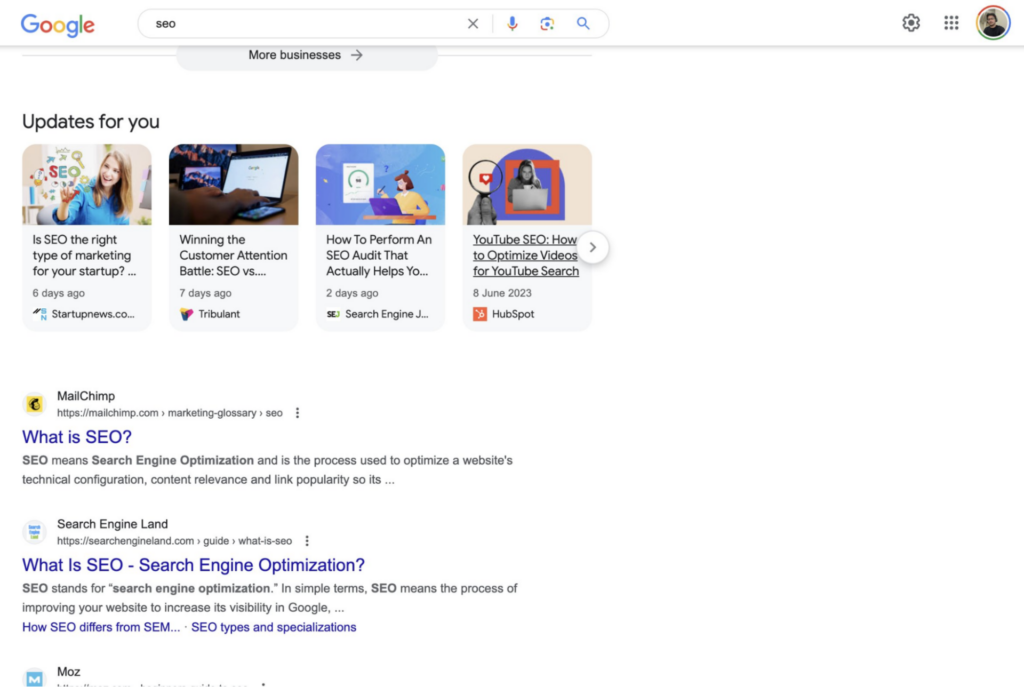
Darrell Mordecai posted this screenshot. He searched for “semantic SEO”.
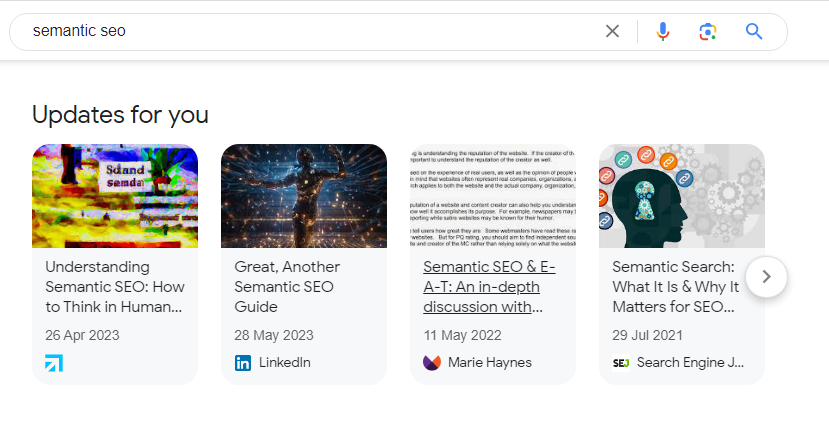
The articles shown to him were not recently written ones. I was surprised to see my discussion with Olaf Kopp in this carousel as, as far as I can see, it does not rank well for the term “semantic SEO”.
Why was it in this carousel, but not in the organic results?
I’ve reached out to ask Darrell whether these are sites he tends to visit or perhaps if he has chosen to follow in Chrome. Or perhaps Google’s systems are simply able to connect in other ways that these pages are recommendations that may be good ones specifically for Darrell.
Did you know you can follow sites in Chrome?
The follow feature is not new. This documentation from Google tells more about what it is and how to optimize for it. It’s only available in the US, New Zealand, South Africa, UK, Canada and Australia on Chrome and on Android. Google gives instructions on linking to the RSS feed of your site from the head section of your pages to improve your chances of being recommended here. However, I’m seeing this option on sites that I know don’t have RSS feeds.
While the option to follow websites in Discover is not new, it appears that Google is pushing the option more and more to suggest that we follow websites. This week I noticed this opportunity to Follow sites in my Chrome Homepage.
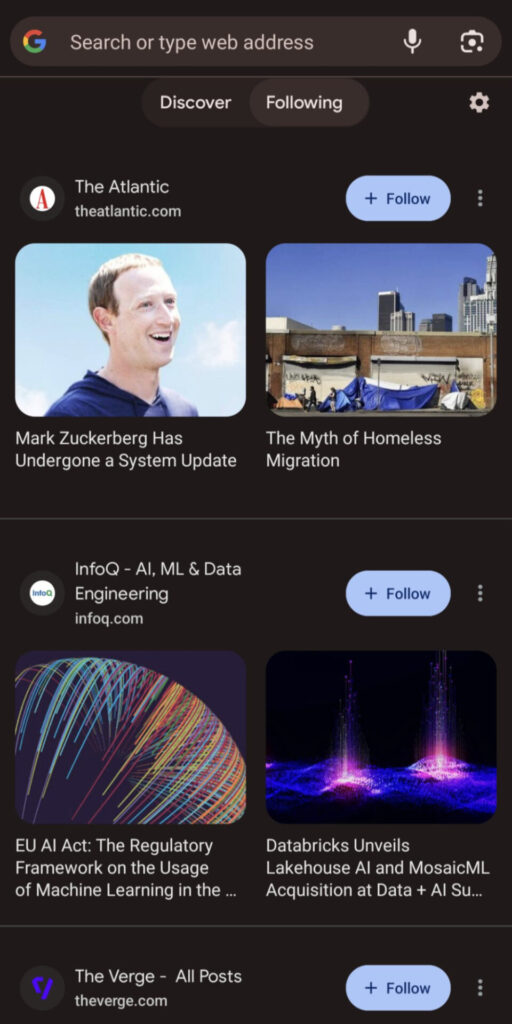
It suggested a number of sites for me and in some cases, it suggested just parts of sites to follow. See above, it’s suggesting all posts from The Verge, but only info on AI, ML & Data from InfoQ.
You can also follow sites directly by clicking on the three dots on the top right of a chrome tab.
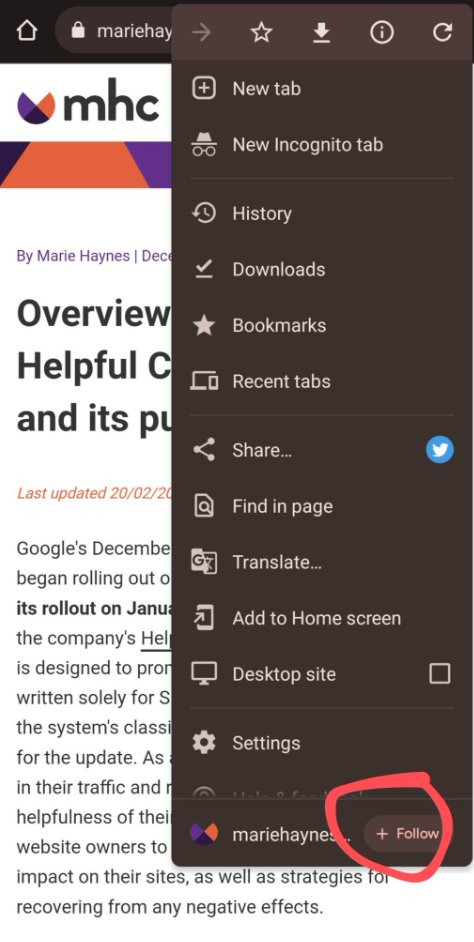
Now, you might argue that this sounds like an RSS feed reader…which has existed forever.
I think it’s much more. Especially when we combine this ability to follow sites with the “Updates for you” tab.
Lily Ray got the Updates for you feature to appear on a desktop search. In hers, there was a “Follow” tab.


The follow feature has let people follow rss feeds from sites in Discover for a while now, but this is the first I’ve seen it right in the search results.
For this query it was pinned to the top of Lily’s search results:
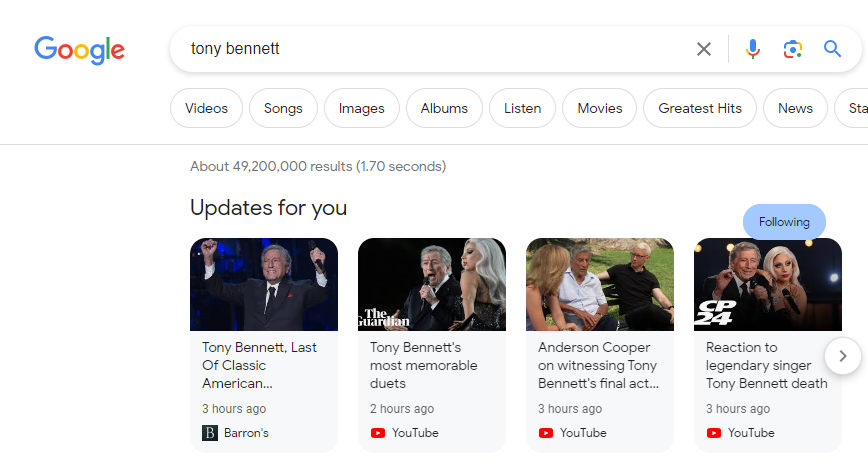
If this goes live, then I would imagine that this will be incredible for brands with a following – brands that are popular. In the subscriber section, we explore more about what the quality rater guidelines say about popularity. It’s important to understand this as the rater guidelines reflect the ideals that are trying to be rewarded by machine learning systems.
This will also be an incredible incentive for site owners to create great content and put it in front of their audience who is hungry to read what they produce.
Take me for example. When I write an article, in order for me to get it in front of my audience, I need to promote it in my newsletter, on Twitter, LinkedIn with the hopes that enough of you will stumble across it and find it.
If I am trying to capture visits from organic search, I need to spend time optimizing for search, tweaking headings, adding internal links, and doing things that are designed to make my article look as good to search engines as possible so that when someone searches for something on a topic that I’ve written on, Google is likely to see it as relevant and helpful. And even then, unless I can optimize so I’m in the top few results, I’m not likely to get much traction from Search.
However, if I’m predicting things correctly, soon, if one of you searches for something related to the helpful content system for example, you won’t just see a list of the most authoritative sites, you’ll also see blog posts from the sites you’ve chosen to follow such as perhaps mine, Glenn Gabe’s, Lily Ray’s or the blog of someone else who is writing about SEO. Perhaps these are the “hidden gems” Google has talked about surfacing in search.
I expect this will allow people with little recognized authority online to gain more traction – not because of SEO skills, but because of the merit of their content. If I come across someone who blogs helpful things on SEO, I can follow their website and, in the future, if I’m searching for something and they’ve written about it, it may appear in my “Updates for you” section.
Developing a following and becoming popular is even more important now.
I’ve often referred to this New York Times article that discusses Google working on a new AI powered search engine powered by the model Gemini. They say, “The new features, under the project name Magi, are being created by designers, engineers and executives working in so-called sprint rooms to tweak and test the latest versions. The new search engine would offer users a far more personalized experience than the company’s current service, attempting to anticipate users’ needs.”
I see Google’s development of the option to follow websites and now to actively recommend it as another step towards creating this personalized experience.
New privacy-focused APIs for ads
Google will start enabling its new privacy-focused APIs on July 24th, with the goal of phasing out third-party cookies entirely by Q3 2024.
We've published a new, in-depth implementation guide detailing how Google Ads is using the Privacy Sandbox Attribution Reporting API to approach ad measurement differently in a cookie-less future… 1/2
— AdsLiaison I’m Away until 9/3 (@adsliaison) July 19, 2023
More discussion from Google on Page Experience
John Mueller was asked whether Page Speed is still a ranking factor. John said that it’s not like there’s a “LoadingTime-50ms” => “ranking-1” mapping. However, a good page experience is still useful. “A great UX doesn’t fix other problems, but users have high expectations nowadays.”

As a reminder, here is Google’s documentation on page experience. This documentation recommends several things we as SEOs have worked on improving for many sites such as improving Core Web Vitals, not having intrusive interstitials and having a good mobile experience.
In my opinion, these two bullet points are so incredibly important:
- How easily can visitors navigate to or locate the main content of your pages?
- Is the page designed so visitors can easily distinguish the main content from other content on your page
When it comes to helpfulness, one of the most important factors is whether searchers can quickly find the part of the content that they’re looking for.
In the subscriber content, I’ve shared some case studies where improving different aspects of page experience has helped sites perform better.
Improving page experience is something we do a lot of exercises on in the helpful content workbook.https://t.co/Nf2M4EUeYI pic.twitter.com/Tg04wG0043
— Marie Haynes (@Marie_Haynes) July 19, 2023
Did John Mueller just call out niche site owners?
Well this was an interesting tweet:
Are there industries where producers of low effort, low quality work brag about the amount of money they make, where they're idolized, and protected by folks in the industry?
— John 🧀 … 🧀 (@JohnMu) July 20, 2023
The general consensus is that John was calling out the niche site owners who have been sharing about their financial successes lately. We don’t know that for sure though.
Personally, I like reading about how many of you are having success with affiliate marketing, content creation, and so on. Several of the people who are posting legitimately do make good money off of content creation. I know this because I’ve brainstormed with several of you.
Why did John say this? Perhaps it was borne out of personal frustration and concerns over the niche site owners who are not so honest. Here are my thoughts:
Today's drama is making me think of this part of Google's helpful content guidance.
On one hand, I admire the drive and willingness to share that many niche site owners have.
On the other, I'm not sure how much longer this window of opportunity will be open. https://t.co/GcsrDNSm3X pic.twitter.com/Y94O9Oo0of
— Marie Haynes (@Marie_Haynes) July 20, 2023
I go into much more detail on these thoughts in podcast this week.
With great timing, I’d recommend you read this article on core web vitals and what really matters by Jamie Indigo.
Comparison carousel
This was spotted by Khushal Bherwani.
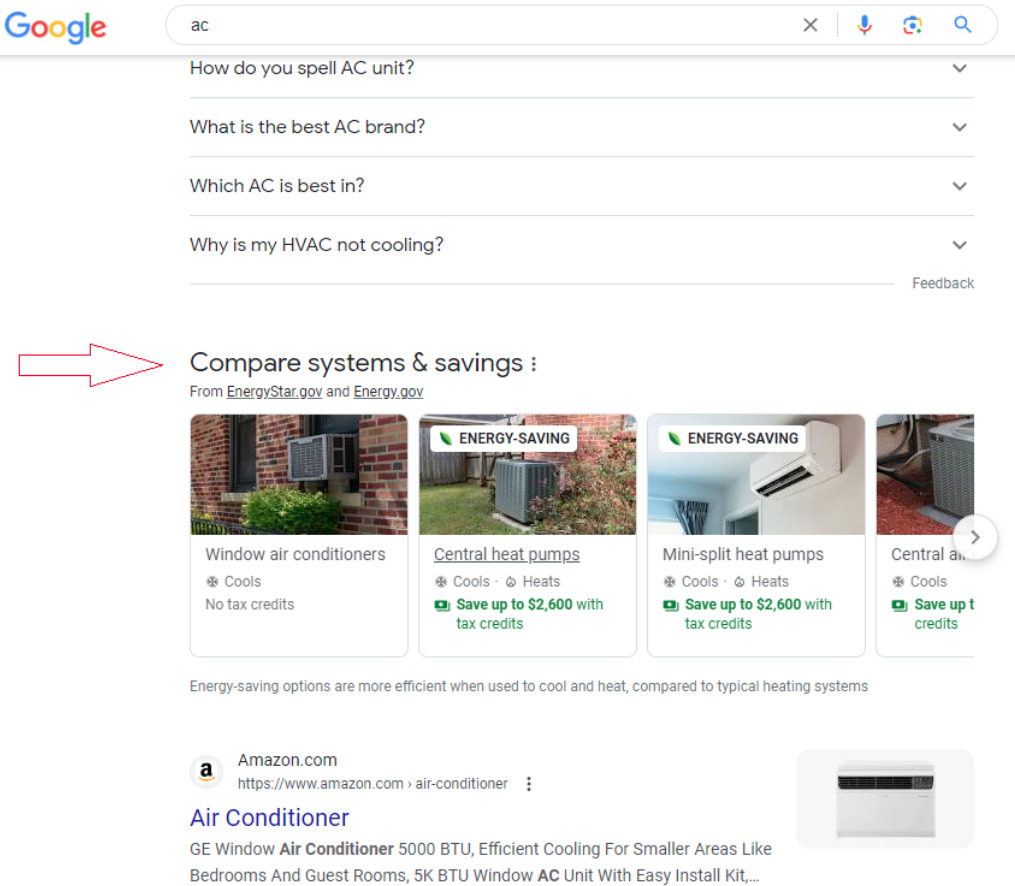
New Podcast Episode!
After a 7 month hiatus, I am thrilled to finally return to podcasting. I took time off of podcast so I could focus on better understanding Google’s machine learned (AI systems) like the helpful content system.
In this episode I share about the evolution of Panda and Penguin and how machine learning systems like the helpful content system have radically changed search.
It feels so good to be recording podcast again. Ty for your patience!
This episode was brewing for many months. Here are my detailed thoughts on how Google’s algorithms have changed dramatically because of AI systems like the helpful content system.
There is a full transcript for this episode. You can also listen to this episode on Youtube.
Subscribe to my podcast on: Apple Podcasts | Spotify | Google Podcasts | Soundcloud
More SEO goodies
Screaming Frog has a new update:
Just released @screamingfrog SEO Spider v.19.0:https://t.co/zUbQwvQTK8
Includes –
📊 Segments
✂️ Visual Custom Extraction
⚙️ Unified Config
🌌 3D Visualisations
🐸 Updated Design & New IssuesAnd lots more. Enjoy! pic.twitter.com/mcExZ5oLkT
— Screaming Frog (@screamingfrog) July 17, 2023
Screaming Frog just introduced a new "Segments" feature.
Now you can see how technical issues impact different templates on your site: pic.twitter.com/nkCsYOZvKD
— Chris Long (@gofishchris) July 18, 2023
Search Off the Record discussion on TLDs
In the latest Search Off the Record podcast, the following questions were covered:
Question: Which top level domain (TLD) should you pick?
Answer: Pick TLD based on target country, avoid super cheap ones prone to spam, generic
TLDs treated equally.
Question: Should domain name match keywords?
Answer: Focus on branding over keywords, as business evolves keywords may become less relevant.
Question: WWW vs non-WWW?
Answer: Redirect both to one or the other to avoid user confusion.
Question: Should I get all TLD variants of my domain?
Answer: Not needed for SEO, more of a business decision for branding.
Question: Subdomain vs subdirectory?
Answer: Avoid opinionated debate topic, do what works for your site structure.
Question: M dot domains?
Answer: Don’t use M dot domains anymore for mobile sites.
Question: What to do with new domain before site is ready?
Answer: Don’t use a “coming soon” page, better to leave unused until ready to avoid indexing.
Glenn Gabe shared an example where Google got a site’s name completely wrong. He’s seeing more of this issue fixed, but it’s still an issue for some sites.
Barry Schwartz noticed changes to the wording in Google’s URL structure guidelines. The guidelines now provide more precise guidance on URL character encoding per internet standards.
Barry also noticed people talking about seeing fewer links in GSC. John Mueller says there is no outage, but rather we should expect numbers to fluctuate.
https://twitter.com/JohnMu/status/1682282705604444160?s=20
There are some interesting comments on Search Engine Roundtable.
Does keyword research help with SEO?
John Mueller says we need to go deeper.
Just to be a bit more elaborate, research alone doesn't change anything. You have to understand what you're researching, what the results mean, make changes, monitor, and adapt. And start at the top again.
— John 🧀 … 🧀 (@JohnMu) July 15, 2023
GA4
Google is publishing videos for a new course on GA4.
New Audiences Report is rolling out to GA4 properties.
Previously, the only audience summary was in the Admin section. This update provides a way more accessible way to access your audience highlights. pic.twitter.com/tF5Ytz7Ydd
— Charles Farina (@CharlesFarina) July 20, 2023
Himanshu Sharma shared a list of 15 things you should do when you set up GA4.
Are you interested in building audiences in Google Analytics 4?
Learn how to use pre-built and suggested audiences or build your own in GA4 → https://t.co/0ijxXdQwU1 pic.twitter.com/zyg461qXTG
— Google Analytics (@googleanalytics) July 18, 2023
SERP Turbulence
The SERP weather tools are continuing to show wild turbulence.
Semrush sensor:

Mozcast:
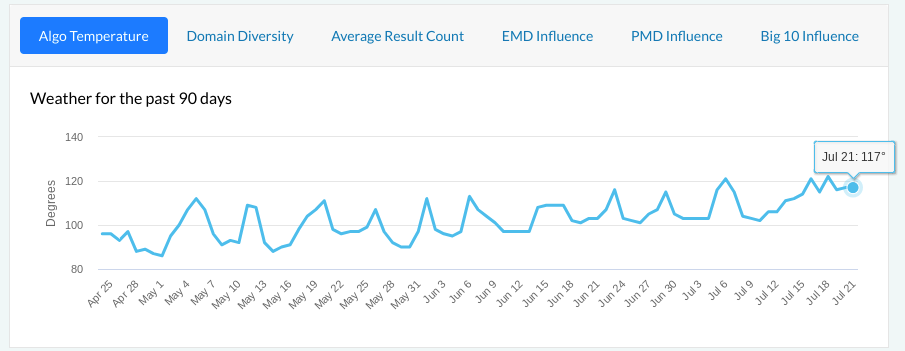
There was some discussion this week about whether these tools are truly showing changes in rankings or whether perhaps new SERP features and UI changes could be causing the apparent flux.
Dr. Pete from Moz says this is unlikely to be the case:
This is a known problem for years and Google changes the DOM all the time. Some CSS divs/ids are even randomized to prevent specific forms of scraping (mostly ad scraping, from what I've found). We know how to correct for this, at least 90%+ of the time.
— Dr. Pete Meyers (@dr_pete) July 18, 2023
Are we going to have an update soon? The last core update was four months ago now (March 15), so we are due!
Glenn Gabe feels that we are seeing increased testing of an update to come, perhaps the next helpful content update?
Several people reported significant changes around July 18. I am no longer noting each unannounced change as I am fairly certain that what we are seeing is simply the algo adjusting as Google’s machine learning systems learn.
Take a look at this image from DejanSEO’s Algoroo. I suspect that Google’s machine learning systems are continually learning now and this is the result:
We haven't recorded anything like this since 2017!!!
Not so much an update but more of a historic event at Google. A major infrastructure change? Keen to see what it boils down to. Source: https://t.co/UkAhU5i1WK pic.twitter.com/1Hu8wLGN6M— DEJAN (@dejanseo) July 24, 2023
Manipulating EEAT with fake authors 😬
Here is an interesting thread where Leslie Harvey found a travel website that appears to be creating fake expert authors and linking to social media profiles in order to manipulate E-E-A-T. Ahrefs’ estimates of organic traffic show a pretty big hit following the April Reviews update. However, they are still pulling in quite a bit of search traffic:
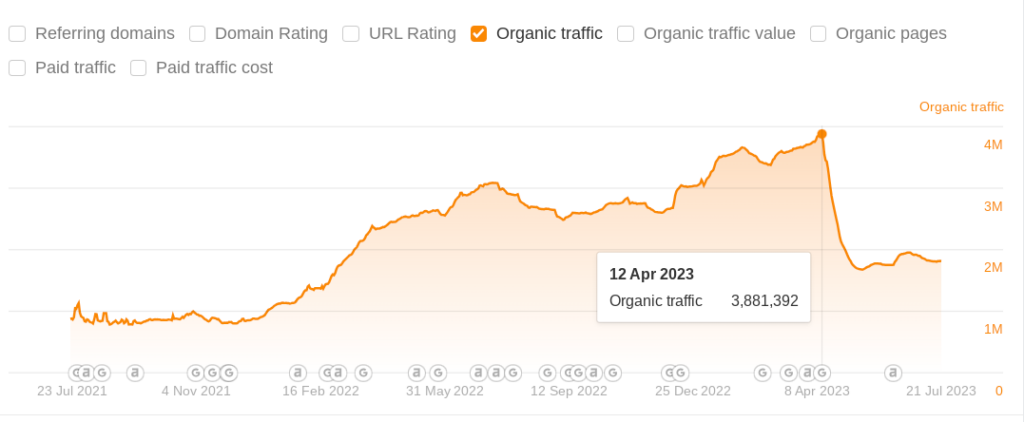
Sites like this frustrate me because they are the type that are ranking based on a knowledge of what Google rewards rather than on the helpfulness of their content. Several of the posts use first hand verbiage like, “And after plenty of research and visiting, I’ve narrowed it down to these kid-friendly all inclusive resorts in the Bahamas.”, with no actual evidence of first hand experience shown in the posts.
This is frustrating because this type of content still can outrank content that truly comes from a place of first hand experience.
I will be watching this site when Google finally pushes the update to the helpful content system designed to further reward experience.
Creating helpful content workbook
 This book is a collection of thoughts and checklists you can use to understand much more about the intent of your searchers and figure out what changes you need to make so that your content is deemed by Google as helpful enough to rank.
This book is a collection of thoughts and checklists you can use to understand much more about the intent of your searchers and figure out what changes you need to make so that your content is deemed by Google as helpful enough to rank.
The helpful content system is destroying so many websites. If your traffic has declined

Here is the article that goes alongside this book. Google’s Helpful Content and Other AI Systems May be Impacting Your Site’s Visibility.
Click here to purchase the helpful content workbook.
AI News and Tips
Government regulation on AI
The Biden administration recently announced securing voluntary commitments from major AI companies like Google, Microsoft, and Meta to address risks like bias and security in artificial intelligence. Ahead of an expected executive order on AI regulation, the companies have agreed to measures like increased testing, research into societal impacts, and transparency about capabilities. However, details remain unclear on how the commitments will be implemented and enforced.
At the same time, Google published this document on their commitment to advancing bold and responsible AI together. In this article they say that in 2017 they reoriented to be an AI first company. (They have previously said 2016).
OpenAI published a similar statement.
If this stuff excites you, Google is looking for people to join their AI Red Team to help make AI safer.
Meta released Llama 2
This language model is open source.
This is huge: Llama-v2 is open source, with a license that authorizes commercial use!
This is going to change the landscape of the LLM market.
Llama-v2 is available on Microsoft Azure and will be available on AWS, Hugging Face and other providersPretrained and fine-tuned…
— Yann LeCun (@ylecun) July 18, 2023
Bard
Ammaar Reshi uploaded a screenshot of a timer app to Bard and asked Bard to recreate it. Bard gave him the code. He needed to make a couple of minor changes, but it worked. Wow.

Alvaro Cintas sketched out a webpage on a napkin, uploaded it to Bard and Bard created code for a simple webpage.
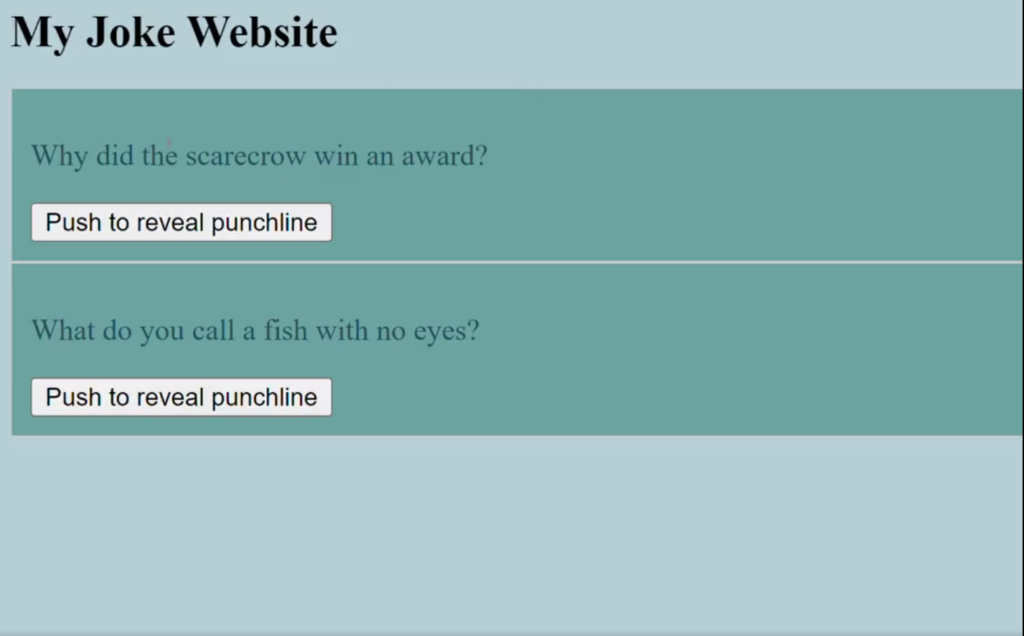
ChatGPT Custom instructions
This is a big deal! On Plus plans (but not in the UK and EU) you can add custom instructions that will be used for all of your conversations. Click on, settings, then Beta features, then turn it on.
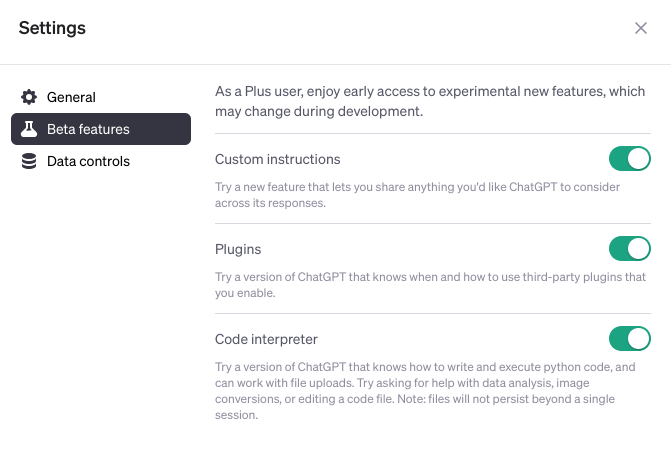

damn i love custom instructions pic.twitter.com/su0BlttJF7
— Sam Altman (@sama) July 22, 2023
They suggest changes such as:
- How formal or casual should ChatGPT be?
- How long or short should responses generally be?
- How do you want to be addressed?
- Should ChatGPT have opinions on topics or remain neutral?
“For example, a teacher crafting a lesson plan no longer has to repeat that they’re teaching 3rd grade science. A developer preferring efficient code in a language that’s not Python – they can say it once, and it’s understood. Grocery shopping for a big family becomes easier, with the model accounting for 6 servings in the grocery list.”
Install steps
-enable new custom instructions in settings
-open settings again, and paste this in the second box
-use code interpreter
-Open new chat and go
-download and upload tasks file as needed, don’t forget, it disappears in chat history pic.twitter.com/0kwjC4sF6V— Nick Dobos (@NickADobos) July 20, 2023
Code interpreter uses
👀 I used OpenAI's Code Interpreter to make Flappy Bird 🐦in 7 minutes:
Code Interpreter/GPT-4 for code generation.
Pre-existing or AI-generated assets for graphics.
—
Here's how to make the game in only 6 steps:
(1): Enter the following prompt:
"write p5.js code for… pic.twitter.com/o4Dic9jtoI
— Alex Ker 🔭 (@thealexker) July 11, 2023
I asked GPT-4 Code Interpreter to make an @elonmusk vs Zuck cage fight game, and it pulled it off in 20 mins!
Here's the game and the convo. Since we're on Twitter, you can only play as Elon for now 😂
Try it here: https://t.co/aZ1Wcm9TdL
GPT convo:https://t.co/tRhST3DYpg pic.twitter.com/NrHUIGbDqv
— Ammaar Reshi (@ammaar) July 12, 2023
Music, visualized by ChatGPT Code Interpreter.
I uploaded whole Billboard Hot 100. AI, can you create an interactive 3d visualization that would highlight "The Song of the Summer"? And make the colors show how often the artist charted.
Play with it here: https://t.co/CH1faJzhg2 pic.twitter.com/QFDDRUcORv
— Ethan Mollick (@emollick) May 8, 2023
I gave GPT Code Interpreter a CSV of airline delays and asked it create a cool interactive map 👇
It asked me for a CSV of airport locations, and one of routes, it cleaned & merged all the data, solving tons of issues without help (like filtering to only the 100 biggest routes). pic.twitter.com/0aln6KH7qJ
— Ethan Mollick (@emollick) May 6, 2023
Increase on ChatGPT-4 message cap
ChatGPT Plus users now have a cap of 50 messages every 3 hours (it used to be 25).
Google says there’s nothing special about AI content
Danny Sullivan from Google said that there’s nothing special about AI content. “AI content has no magic ranking powers. If *content* is helpful, then it might succeed.”
As I wrote about extensively in last week’s subscriber content, I do believe that using AI can help you to do things like better understand and answer user intent, craft good headings, and improve the topical relevance of content. AI content alone isn’t magical, but using AI to help you make more helpful content is possible.
Here’s more from this discussion:
It's still not correct that AI content will be "well-received by search engines," at least for us. There's lots of AI content on the web that doesn't rank well and hence isn't well received. AI content has no magic ranking powers. If *content* is helpful, then it might succeed.
— Google SearchLiaison (@searchliaison) July 18, 2023
Peter! I (because I'm a person, not a bot), don't know that it's obvious to everyone. That's why I keep emphasizing it's not about whether content is AI generated, staff writer generated, freelance generate or the exact production method but rather the purpose and quality….
— Google SearchLiaison (@searchliaison) July 18, 2023
A few more AI goodies
Beginner’s guide to using the OpenAI API
Lily Ray showed you can use Claude to check for plagiarism between up to 5 documents.
Nicholas McDonough found this Google patent that talks about using language models in generating automated assistant responses. I really can see search morphing into something that runs on an interface like this, with Google essentially being our assistant rather than a search engine.
This is the next midjourney
Been playing with this for a week now and it’s addicting
Fully AI generated music 🤯 https://t.co/QGKOUM7DA4
— Harrison Chase (@hwchase17) July 21, 2023
Demis Hassabis' NYT interview
This summary is all mine – not Claude’s as I found this interview so fascinating. Here are a few things I learned in this interview with Deep Mind’s Co-Founder.
He talks about two different approaches to solving problems. The traditional method is a logic-based or rules-based system. In this approach, we know the expected outcome and we create rules a machine can use to work towards solving the problem. For example, when Deep Blue from IBM defeated world champion Garry Kasparov in chess in the 90s, it was a system that was built by encoding the rules of chess and possible moves.
Machine learning is different. When DeepMind created AlphaGo, it learned to play the complex game of Go itself and actually came up with better strategies and heuristics than humans could have programmed into it.
Deep Mind created a system called DQN (Deep Q Network) that learned to play Atari games by only being given information about the pixels on the screen. It didn’ know anything about the games but figured out how to succeed. Every time it did something that raised its score, it would learn by reinforcement that that combination of actions was a good thing.
Now, it’s one thing to teach a machine to win a game of Pong, but what’s really mind blowing is how AlphaFold from DeepMind is solving science. Every bodily function is mediated by proteins – sequences of amino acids in different 3D shapes. A lot of disease is caused by proteins misfolding or folding wrong. Also, if you want to design drugs to combat diseases, you need to know the surface and shape of proteins and which parts to target with your drug.
For example, Covid-19 has a protein structure that looks like a spike. Knowing that means you can design something that fits like a glove around it to block its action.
I really liked the discussion about why language models hallucinate. Dr. Hassabis says language models right now are like “idiot savants”. They just output the immediate thing that they predict. He says that reinforcement learning with human feedback helps the models pick not necessarily what the most likely answer is, but what the best one is. The models are improving.
Near the end of the interview Hassabis talks about Gemini, Google’s next era of systems: “I think there’s going to be a combination of the two things. So we’ll have this increasingly more powerful general system that you basically interact with through language but has other capabilities, general capabilities, like math and coding, and perhaps some reasoning and planning, eventually, in the next generations of these systems.”
Dr. Hassabis described a few other systems his team is working on including one to stabilize nuclear fusion, one to optimize infrastructure to help with climate changes and sustainability.These are terribly exciting, but there is concern that now these innovations are being somewhat driven around the world by commercialism.
The interview finished with some book suggestions from Dr. Hassabis:
- The Fabric of Reality by David Deutsch.
- Permutation City by Greg Egan.
- Consider Phlebas by Iain Banks
Local SEO
Three tips to grow local SEO fast:
🔥Check out @ownyourserp's 3 tips to grow local SEO fast! https://t.co/PD6LXY1kS5
— Joy Hawkins (@JoyanneHawkins) July 20, 2023
We were just talking about local SEO for a multi-location client in the office earlier today so this episode of @brightlocal's podcast is perfectly timed.
Oh and it's full of insights and great advice too.
Thanks @clairecarlile & @krystal_taing!https://t.co/uF5dtM971O
— Jack Chambers-Ward (@JLWChambers) July 20, 2023
I’ll be speaking at Local U this fall just outside of Toronto alongside an incredible lineup:
Check out this amazing lineup!! 🎉🎉 @Marie_Haynes @ColanNielsen @DarrenShaw_ @SeoAllie @matthewhuntme @clairecarlile @danaditomaso https://t.co/e0pa4cIE6H
— Joy Hawkins (@JoyanneHawkins) July 20, 2023
Great articles published this week
Here are some of the great articles I read this week. In the subscriber content, I’ve included a summary of what’s is most interesting or important from each.
How to use ChatGPT to uncover keyword variations other tools miss (prompts included) – Tony Hill on Search Engine Land
Why using AI to create YMYL experts is a REALLY bad idea – Jo OReilly on Search Engine Land
How It’s Going After Removing Google AMP Pages 3 Weeks Ago – Barry Schwartz on Search Engine Roundtable
Tangential SEO: Using Google Bard to identify content ideas fast – Luca Tagliaferro on Search Engine Land
SEO Jobs
- Looking for a new SEO job? SEOjobs.com is a job board curated by real SEOs for SEOs. Take a look at five of the hottest SEO job listing this week (below) and sign up for the weekly job listing email only available at SEOjobs.com.
- SEO & Content Strategist ~ Stratabeat ~ $65k-$85k ~ Remote (US)
- SEO Specialist ~ Studio Hawk ~ 65k – 90k + UK to AU Relocation package ~ Hybrid ~ Melbourne, Australia
- Local SEO Manager ~ Lasso MD ~ $60-$70k ~ Remote (US)
- SEO Strategist ~ US Bank ~ $87-113K ~ Remote (US)
- Associate Director, SEO ~ DEPT ~ $103k-$128k ~ Remote (US)
Piggybacking @CyrusShepard awesome post with a link to become a Search Evaluator!
$14.00/hr
Flexible hours
Remote (US)Job description and application details: https://t.co/sJfH0MQiJ9 https://t.co/x6S16EBwqC
— Nick LeRoy (@NickLeRoy) July 20, 2023
Subscriber Content
This week’s subscriber content includes the following:
- Does it make sense to work on improving Core Web Vitals? I had a bunch of people ask me whether working on Core Web Vitals is worth it, so spent some time finding case studies that show that in some cases, yes, it can make a big difference. I also included the prompts I used to have Claude help me summarize vast amounts of case study information.
- New documentation from Google on how to build trust with your customers. (Sure sounds like E-E-A-T to me)
- What the QRG says about popularity – Your reputation online for your topics is incredibly important.
- Ways people are using ChatGPT, esp code interpreter for SEO
- Summaries of the articles recommended in this newlsetter – I used a combination of Claude plus my summary skills for this part.
Next week: Analyzing content impacted by the helpful content system
If you are willing to share and have me comment on your site, please respond to this Twitter thread.
Going to analyze some examples of helpful vs unhelpful content in newsletter.
If you think you're impacted by the helpful content system (often with a steady decline since Nov 2022), leave a reply with your URL plus a keyword you used to rank well for.
No DMs pls. You'll need…
— Marie Haynes (@Marie_Haynes) July 21, 2023




